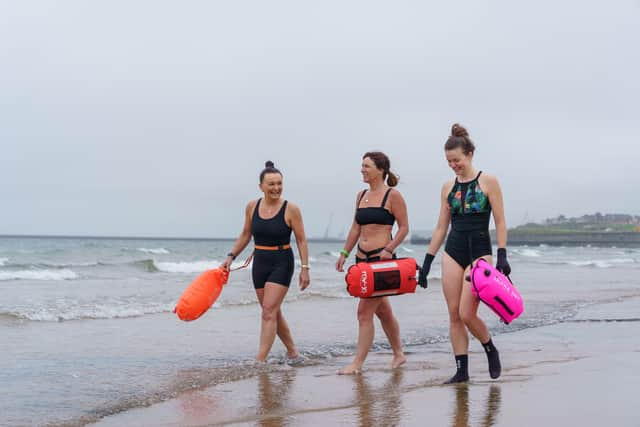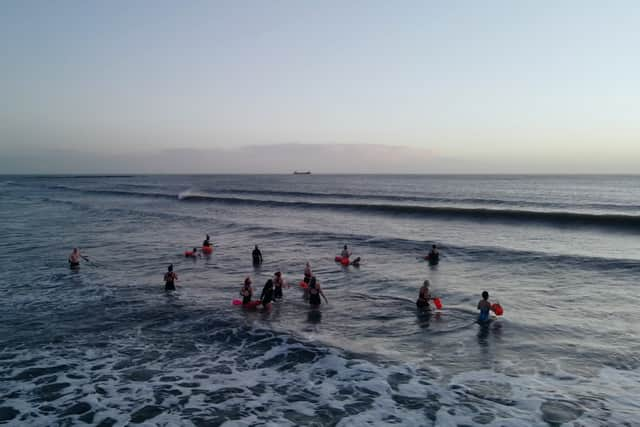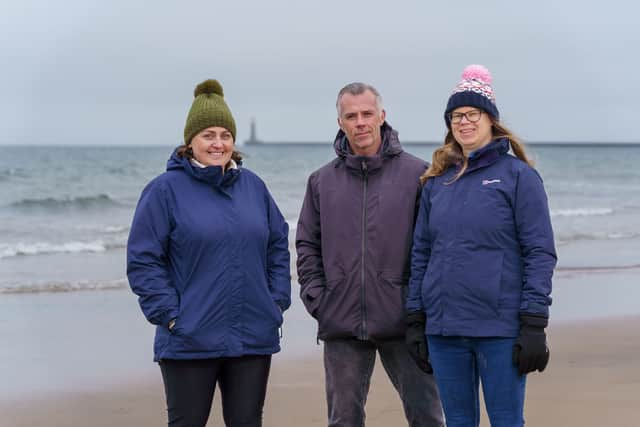Sunderland’s ‘Wild Sea Women’ at centre of study on potential health benefits of outdoor swimming
and live on Freeview channel 276
With public swimming pools closed during covid restrictions, and with beach-loves unable to travel, swimming enthusiasts and those new to the activity looked for opportunities closer to home.
Among them were members of Wild Sea Women, which began in Sunderland in June 2020 with just a handful of people keen to connect and dip in the sea together for their health and wellbeing.
Advertisement
Hide AdAdvertisement
Hide AdSince then, the group has taken off, capturing the imagination of swimmers and there are now some 12,000 members across the North East and into Scotland.
Among them is Bridie Hodgson, a final-year Biomedical Science degree student at the University of Sunderland, who wanted to draw on her scientific knowledge to discover more about any biological changes to these cold-water swimmers’ bodies, which could shed light on the mental and physical health benefits they experience.
Working alongside Dr Katrin Jaedicke, a Senior Lecturer in Applied Biosciences and a salivary biomarkers scientist, together with other final-year project students they spent time with the Wild Sea Women on two mornings at Seaburn beach, taking saliva tests before they entered the water and afterwards.
Tests were then carried out in the University’s labs.


The project also attracted interest from North East filmmaker Dan Prince, who documented the stages, and results, capturing the first time anyone has ever tested cold water exposure in saliva samples, charting the journey between scientists and swimmers.
Advertisement
Hide AdAdvertisement
Hide AdDr Jaedicke said: “The enthusiasm from all involved in this project has been the real success story behind the project. These women were so willing to stand there and spit in a tube at 6am on the beach every morning, and be filmed in the process, we were incredibly lucky to have a group so involved in the process.”
She added: “We wanted to discover if there were any biological changes in the body reacting to the cold-water environment, through saliva tests.
“While the saliva results did not show any significant changes in the women’s bio-markers, this was more about feasibility than anything else, can we actually do this type of research on a larger scale, and we’ve just opened the doors.
“Clearly there are changes taking place in the physical and mental wellbeing of these women, and this needs further investigation.”
Advertisement
Hide AdAdvertisement
Hide AdBridie will now take the project forward as part of a master’s degree, with a larger group of the Wild Sea Women, from across the region and Scotland.
The new study will look at women going through menopause, checking for biomarkers which play an important role in illuminating relationships among environmental exposures, human biology, and disease. Scientists can use biomarkers to better understand fundamental biological processes.


There will also be work with the University of Sunderland’s Psychology Department, to measure psychological parameters in collaboration with the swimmers.
Bridie said: “This is a terrific opportunity to undertake some very fascinating work, and the University of Sunderland has allowed me to put the skills I’ve learned over the previous three years into practice.
Advertisement
Hide AdAdvertisement
Hide Ad“I have confidence since I have been engaged in every aspect of the project, from recruiting to meeting participants and working with samples. Our next step is to pursue a master’s degree in September with a similar project.
“The Wild Sea Women made this possible, and Katrin has been an inspiring lecturer throughout my entire journey, providing endless guidance and support.”
Hayley Dorian, who set up Wild Sea Women in 2020, added: “It’s been a privilege and such a fantastic opportunity to work alongside the science team at the University of Sunderland, to help with their incredibly interesting research.
“Although it would have been great for us all to see some tangible proof of the benefits of going into the sea from this particular project, we know from our own personal experience that the sea improves our health in ways we may never understand.”
Advertisement
Hide AdAdvertisement
Hide Ad

Dan Prince explained the process behind creating the film, he said: “Even though the results were not what the students were looking for, I felt their journey was just as important as the research for the story.
“I really enjoyed working with them on this. Going from the sea to the lab showed two very different worlds, but all starting from only one subject - sea swimming. This was really interesting for me to capture.”
Comment Guidelines
National World encourages reader discussion on our stories. User feedback, insights and back-and-forth exchanges add a rich layer of context to reporting. Please review our Community Guidelines before commenting.